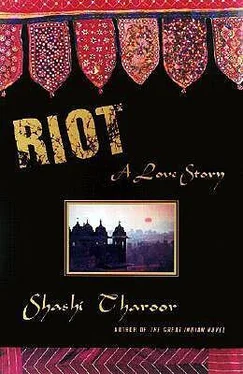She was beside herself, but she had found a certain steely determination. She asked us what she could do. Kadambari and I explained her options, and told her about the abortion services at the government hospital. “You mean, remove the child? Destroy it?” She flinched slightly as she asked, and when we answered yes, she closed her eyes tightly for a minute. But when she opened them again it was to ask a practical question: Did she need her husband’s consent to go to the hospital for an abortion?
No, we told her. She was a free and responsible adult. Under the law, it was her body, and her decision. She didn’t need anyone’s permission.
Then, she said, she was going to do it.
She looked at us, and it was a new woman I saw, Cin. Not the scared and beaten woman of the previous encounters. Her face was calm. This worm had turned.
Could we help, she asked. Kadambari was about to answer no, that all we could do was to provide the address and telephone number of the abortion clinic, but I interrupted. I knew Fatima’d never be able to get to a telephone, let alone go to the clinic in person to set things up. “We’ll make the appointment for you,” I said. It was stretching our mandate a bit, but I felt that Fatima Bi had gone so far toward taking control of her own body, her own life, that we needed to give her just that little extra bit of support.
Kadambari didn’t like it one bit. The woman’s got no real commitment to the cause; for her it’s just a job. She looked at me, with her inscrutably dark and sallow face, the black hair pulled tightly back from her forehead, and I knew she thought I was a foreign busybody interfering in something that was none of my business, making things more difficult for her. But I was having none of it. “You’re an extension worker,” I reminded her. “It’s time to extend yourself and work.” I don’t think she’ll ever forgive me for that.
Of course I asked Fatima if she wasn’t afraid of her husband’s reaction to our visit. Surely he might hear from the neighbors, from someone in this promiscuously crowded basti, that we’d come calling? And when she finally went to the clinic, might he not hear of it? I didn’t want Fatima to go ahead without having thought it all through.
It turned out that her husband, Ali, had gone out of town for three days. By the time he was back, she wanted it to be over.
“And then?” I asked. “Won’t he be angry?”
“He’ll be angry,” Fatima replied, her voice flat in the noontime stillness. “But by then it’ll be too late. It won’t matter anymore.”
Lakshman and Priscilla
August 22, 1989
— I love you.
[Silence.]
— I said I love you.
— I heard you.
— Is that all you have to say?
— What does it mean?
— What do you mean, what does it mean?
— I know what I mean when I say I love you. I don’t say it often. I don’t say it lightly. What does it mean when you say it?
— It means I love you. I love the sound of your voice. I love the way your hair tumbles down your face. I love the way you move, the way you arrange your limbs when you sit, or lie, or stand. I love your habit of writing poetry and hiding it away in your scrapbook. I love making love to you. I love the way your face looks when I am moving inside you. I love the sounds you make on our little mat in this magical room. I love being loved by you.
— I know you love me. I just don’t know how much.
— I love you! Isn’t that enough? I don’t think it’s possible to love anyone more than I love you.
— Those are just words. Words are just words until you act on them.
— I am acting on them. I’m with you, aren’t I?
— Yes, but that’s for now. You’ll be gone in an hour, more or less. Back to your wife, your daughter. To a home you don’t share with me.
— You know what my situation is. I have never misled you.
— I know your situation. But that doesn’t make it any easier.
— I know it’s not easy for you. It’s not easy for me.
— It’s easy enough. A woman who’s available at your convenience, two evenings a week. You don’t have to give up anything. Your work, your social life, your family, your official commitments. You have it all. Including me.
— You make it sound so simple. As if there were no effort, no commitment involved in carving out the you-shaped space in my life, a space that has grown and spread through every part of my being. I didn’t have room for you in my life, Priscilla. I didn’t need you in my life. I had trained myself to live without love. I told you when we first became involved: This is crazy. For you. For me. Do you remember my words, the second time we met at the Kotli, when you sent me that note and I came here? I said, “I’m overworked, overweight, and married.” And you said, I don’t care.
— I still don’t care.
— But you do. You do care. And you’ve reminded me of it again today.
— How can I not remind you of it? I live with it every day With knowing that the man I love has no room for me in his day, unless it happens to be a Tuesday or Saturday. That he will leave an evening with me for a dinner with his wife. That if he’s with me, it’s for an hour, at most two, and then he’ll be off, leaving me to hug my own loneliness.
— Wouldn’t you have been lonelier without me? Look, I know how you feel. I live with my own guilt.
— I know you do. But what have you had to give up for me?
— My peace of mind.
— That comes with the territory. If you want peace of mind, don’t fall in love.
— I didn’t intend to fall in love. When I try and juggle the hundred things in my life, when I feel the guilt of neglecting my daughter, of letting my work pile up in my in-tray, of putting a couple of hours with you ahead of going to the temple with my family, of fearing I will be missed precisely when I cannot explain my absence, I feel that falling in love was the most irresponsible thing I could possibly have done.
— What a curious word to use about love. Irresponsible! So you’re suffering guilt about being irresponsible. That doesn’t sound much like sacrifice. Other men would give up worlds to have the woman they love. You’ve given up nothing.
— Why must it be necessary to have given up something?
[Silence.]
— Anyway, I have. I’ve given up my certitudes.
— Your certitudes.
— I have. I’ve given up the carefully circumscribed order of my life, with its assumptions, its compromises, its predictabilities. I’ve given up the sense a Brahmin strives all his life to attain, the sense of being anchored to the world. Loving you, I’m adrift. Everything around me is turbulence. I do not know whether I’ll sail to a new and sunny paradise with you or crash foundering on the rocks. To me, at my stage in life, that’s a lot to give up.
— I’ve given up a few things too. Do you know what it’s like to have a man you can’t speak to when you need him? To feel the ache of needing you and knowing you’re beyond reach? To not be able to acknowledge you in public, not to go out openly together, not to be able to see you across a crowded room and know that we belong together and I’m leaving with you?
— Do you think I don’t feel the same need? Don’t you think that every fiber of my being is clamoring to shout to the world, “She’s mine, I love her, she loves me”?
— But you can’t. You’ve got too much to lose.
— Yes.
— Or perhaps you just aren’t sure enough of your love.
— That’s nonsense. You know I love you.
— There’s a French saying, “There is no love, there are only proofs of love.”
— You’ve had plenty of proofs of my love.
Читать дальше












